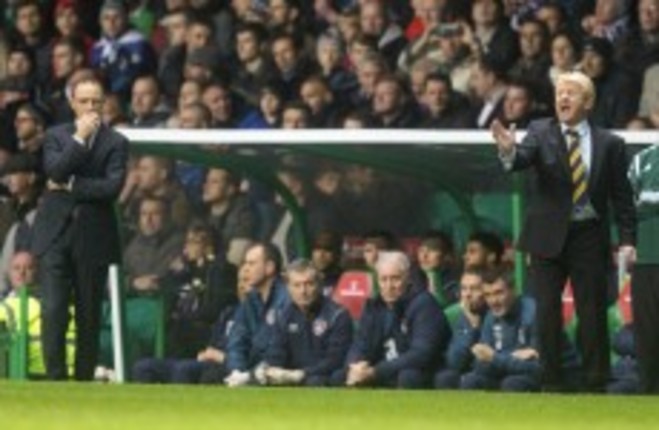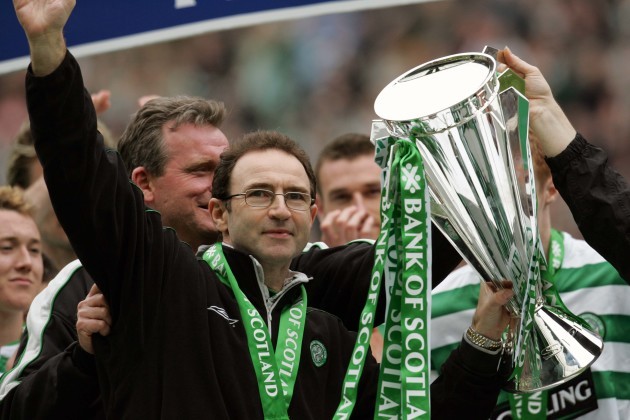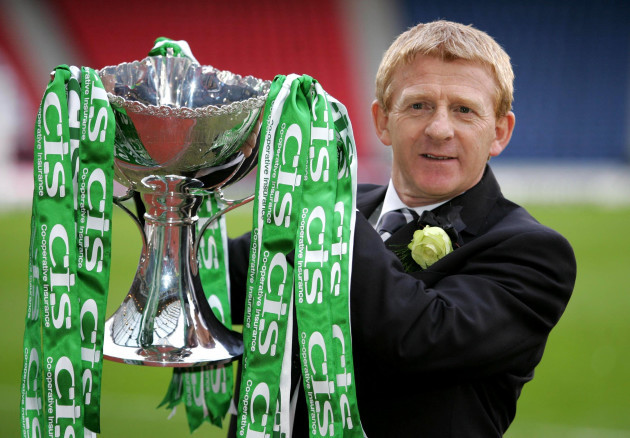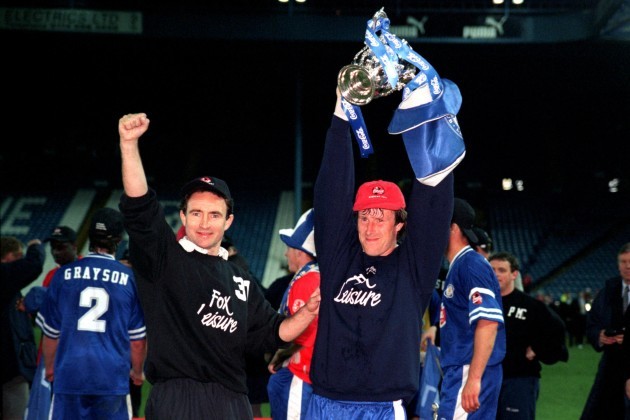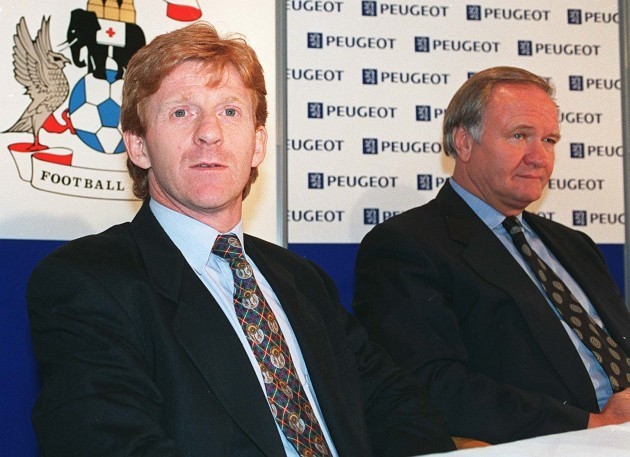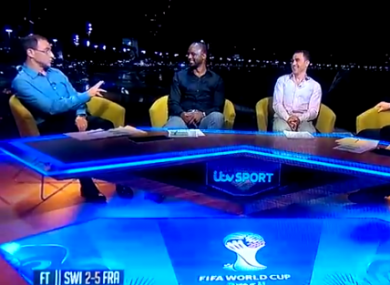Updated at 21.00
TWO MEN WHO have followed remarkably similar career paths will lock horns this weekend in a crucial Euro 2016 qualifier at the Aviva Stadium.
Martin O’Neill and Gordon Strachan have seen their careers revived in international management.
But both men know that qualification for Euro 2016 will likely come at the expense of the other. This is not the first time that these two have had an impact on the other’s career.
Celtic
O’Neill had a big job on his hands when he took over at Celtic in 2000. The ‘dream team’ of John Barnes and Kenny Dalglish had failed to live up to expectations, as Celtic finished 21 points behind their Old Firm rivals Rangers.
But it wasn’t long before O’Neill had revitalised the club. All in all, Celtic would win three league titles, three Scottish Cups and a Scottish League Cup during his ludicrously successful time in charge. He also brought the club to the 2003 Uefa Cup final, where they suffered a heart-breaking defeat in extra time to a young Jose Mourinho and his Porto side. O’Neill was loved by the Celtic Park faithful and when he stepped down in 2005, he was widely regarded as one of the club’s most successful managers.
The unenviable task of succeeding O’Neill was given to Gordon Strachan. It was a tough act to follow but the Scot’s time in charge was arguably as successful. During this period, Celtic won three league titles, two Scottish League Cups and a Scottish Cup. While fans of O’Neill will point to the Uefa Cup final in 2003, Strachan did something the Northern Irishman failed to do when he lead Celtic to the knock-out stages of the Champions League.
Although both Celtic teams were successful, they were very different beasts. O’Neill had Henrik Larsson at Celtic, a goal-machine that notched 174 goals in 221 appearances. He also played a very direct style of football. Even when Larsson left in 2004, Celtic continued to succeed from a direct, physical approach with Chris Sutton and John Hartson up front.
Strachan struggled to put his stamp on the team at the beginning. Two embarrassing defeats, a 5-0 loss to Artmedia Bratislava and a shock defeat in the Scottish Cup to First Division side Clyde, were particular low-points. But he soon restructured the team and brought in players that wouldn’t have suited O’Neill’s Celtic. Players like Thomas Gravesen, Kenny Miller and particularly Shunsuke Nakamura got Celtic playing a more exciting brand of football.
England
Both men had ups and down during their time in English club management. O’Neill’s most successful spell came before his time at Celtic, when he managed Leicester City from 1995-2000. In his first season in charge, Leicester were promoted to the Premier League. From there, he won two League Cups in 1997 and 2000, as well as reaching the final again in 1999. He also established them as a mid-table side, finishing in the top 10 consistently from 1997-2000.
While Strachan wouldn’t have the same success, he also had his most successful time in England during the same period. He took over a struggling Coventry side in 1996 and led them to an 11th place finish in 1997-98 and also reached the quarter-finals of the FA Cup. He made some astute signings, with a young Robbie Keane proving to be a bargain at £5m. They would go on to have reasonably successful seasons for a club of that size the following two years, with 15th and 14th place finishes. But they were relegated at the end of the 2000-01 season. From there he took charge at Southampton, who were widely tipped for relegation in 2001. He managed to turn around they fortunes and led them to 11th place. The very next year they finished eight and reached the FA Cup final.
But both man struggled when they returned to England following their successful spells in charge of Celtic. O’Neill joined Aston Villa and spent £120m in his four years in charge, trying to crack the top four. He would eventually resign in 2010 after a dispute with Randy Lerner, the Villa owner. From there, he had an even disappointing spell in charge of Sunderland before being replaced by Paolo Di Canio.
Strachan, meanwhile, joined Middlesbrough in 2009 but could do nothing to stop their slide down the table. After an awful start to the 2010-11 season, Boro were down in 20th place and Strachan left the club by mutual consent. He would spend two years out of management before taking the Scotland job.
Punditry
After their disappointing returns to England, both men took a break from the game and instead did some work for television as analysts. O’Neill worked for the BBC and ITV at the World Cup, European Championships and for Champions League matches. While working for ITV, it seems the two men got quite close.
“I wouldn’t call him a close friend but once we meet we get on great together,” Strachan told the press back in November. ”It’s not so much football we talk about, it’s films, music and TV programmes. We spent half an hour in the back of mini vans going about Rio de Janeiro [after World Cup broadcasts]. We would drop the young ones off at nightclubs and we went home and listened to music on YouTube.
“We did stupid things like having our meal on the bed, me and him watching football. It was like Morecambe & Wise. He starts a conversation then goes somewhere else and you think ‘where’s he going now?’. He’s a good storyteller, good company.”
International management
The move into international management seems to have revitalised both men’s careers. They have restored enthusiasm to sides that badly needed a lift. Ireland and Scotland have been far from pretty to watch in recent years but if you watch some of their recent games, players like Aiden McGeady, Wes Hoolahan and Steven Naismith have been given license to express themselves on the ball.
You only have to look at their performances against sides like Germany and Poland, who are considered to be far superior opposition. You could argue that Scotland played better than Ireland did against Germany. They took the game to the Germans and were unlucky to go down 2-1. We put on one of our famous defensive displays and got that magical late equaliser from John O’Shea. But the point is that both sides have shown examples of more positive, expansive football and this seems to have created more excitement in the national teams.
Up to this point, the two men’s careers have had amazing parallels. But this weekend, one of them will be celebrating their continued resurgence while the others if forced to regroup and reassess.
Originally published Thursday at 18.17
